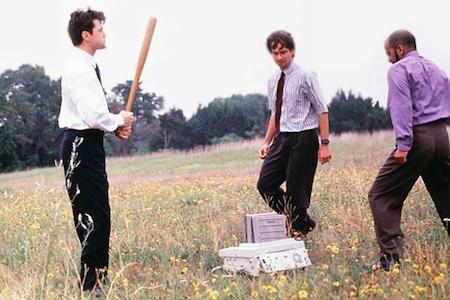Face It, We’re Cubed
Published: Apr 29, 2014

There’s a very good chance that right now you’re seated in a swiveling, ergonomic chair on wheels, staring at a computer screen, reading these digital words within three or four flimsy chest-high walls, just beyond which is another person who’s seated in a swiveling, ergonomic chair on wheels, staring at a computer screen, reading other digital words within three or four flimsy chest-high walls, just beyond which is another person … and so on, and so on, and so on. That is, there’s a good chance you’re one of 40 million Americans that now spend at least eight hours each Monday through Friday in something called a cubicle.
And if you’ve ever wanted to know how you and your so-called colleagues ended up spending a good portion of your lives inside a cubicle, then you’ll most definitely want to check out Cubed: A Secret History of the Workplace, by n+1 editor Nikil Saval, who, according to the New York Times, is a “vigorous,” “thoughtful” writer “above the rank of most nonfiction authors,” in part because “he doesn’t merely present information” but also “turns each new fact over in his mind, right in front of you, holding it to the light.” In other words, give that man a raise.
In any case:
When [Saval] discovers that half of Americans report that their bathrooms are larger than their cubicles … he writes: “One wonders to what extent the extravagant growth of the American bathroom, and of the suburban home in general, is partly a reaction against the shrinking of cubicles, where the owners of those bathrooms spend so much of their time.”
And according to Book Forum, “Saval’s opus” is a “lush, funny, and unexpectedly fascinating history of the workplace,” and the author's extensive research and ability to cook up an interesting tale warrant some extra PTO, among other things.
Saval deserves a lifetime supply of Advil, not just for the almost perverse depth of his headache-inducing research—the Proceedings of the 1935 Conference of the National Office Management Association! the Intel International Science and Engineering Fair! the Secret History of the Aeron Chair!—but also for the heroic effort he undertakes in successfully weaving his disparate dry-as-toast sources into genuine entertainment.
However, according to Slate, Cubed isn’t much more than a plain piece of bread—until, that is, it nears its end. That’s when Saval begins to address more serious matters, such as the “worrisome future of work”—the “irreversible loss in stability, the increasingly prevalent notion that you can’t depend on a job for more than a few months.”
The New Republic also gives Cubed mixed reviews, while pointing out:
Saval is of course aware that he’s telling the story of the office at a moment when it’s in flux. Personal computing and the Internet have made telecommuting feasible and the freelance economy is growing, so that many people who would have labored in a cubicle a generation ago now do their jobs at home or in coffee shops. [And Saval] accepts the precarious life of the freelancer as preferable to that of the old-fashioned cube-dweller. He criticizes “organizations that insist on hierarchy” and praises “the willingness of workers to discard status privileges like desks and offices.”
Meanwhile, most reviewers of Saval’s book agree that, irrespective of office design, not much has changed in several decades when it comes to employee happiness. Office with door, cubicle, open-office plan, home office, coffee shop communal table … they all still produce the same end result: a great number of disgruntled worker bees working for the man.
To that end, here, perhaps apropos, on the penultimate day of National Poetry Month, is the great American poet Walt Whitman, in 1865, describing U.S. office workers (the following passage appears near the beginning of Saval’s book):
… a slender and round-shouldered generation, of minute leg, chalky face and hollow chest … trig and prim in great glow of shiny boots, clean shirts—sometimes, just now, of extraordinary patterns, as if over-run with bugs!—tight pantaloons … and hair all soaked and ‘slickry’ with sickening oils … what wretched, spindling, ‘forked radishes’ would they be, and how ridiculously would their natty demeanor appear if suddenly they could all be stript naked?
Okay, reading break’s over, now back on your heads!
Follow me @VaultFinance.
Read More:
The Office Space We Love to Hate (NYT)
Why Do Our Offices Make Us So Miserable? (New Republic)
Little Workers in Pretty Boxes (Slate)
It’s a Living (Book Forum)
The Revolution Against Open-Office Plans Has Begun (Vault)
